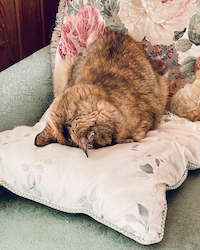Sleep
My Life with Insomnia
A big fat lesson in letting go.
Posted March 20, 2022 Reviewed by Devon Frye
Key points
- The solution for insomnia might be letting go of trying to find solutions.
- It helps to stop thinking when you're trying to fall asleep, but that can't be forced either.
- Letting go of trying to sleep (in order to fall asleep) is hard but it can be done.
I can’t make myself sleep. I keep forgetting that and then remembering it.
Years ago I took sleep drugs, first over-the-counter and then prescription ones, which worked fairly well for a pretty long time. But eventually, I came to the solid realization that all those drugs made me feel worse the next day than if I didn’t sleep at all and I had to stop taking them.
But I’m still holding out hope that some natural supplement will make me sleep without paying a price. Recently I’ve tried CBD gummies, CBD gummies with THC, ashwagandha, and valerian root together, and a liquid form of melatonin, all of which were recommended to me by friends who said they worked for them, and all of which worked for me pretty well for a day or two, prompting me to think I’d found a solution and tell all my friends I’d found a solution. But then on the third day, they stopped working, sometimes disastrously, like when I took ashwagandha and valerian at three in the morning, never went back to sleep, and felt horrible all the next day.
So I’m back to remembering—accepting—that I can’t make myself sleep. I am powerless over sleep and my life has become unmanageable.
I have early morning insomnia. I usually go to sleep fine at night, then wake up with a start at 4:30 or 3:30 or 2:30 or, God forbid, 1:30. At first, I have the illusion that this time I’ll go back to sleep. I’m going back to sleep right now, I tell myself over and over; this mantra used to work about 65 percent of the time but seems to have stopped working lately.
When I don’t go back to sleep, eventually I notice that I’ve started doing what I’ve learned is fatal to sleep: I’m thinking. I’ve come to the conclusion that thinking’s the real problem, and the only solution is to stop thinking which is nearly impossible. All the solutions for insomnia offered by sleep experts and articles you see in the newspaper, black-out curtains, keeping a regular sleep schedule, avoiding the computer and the phone for an hour before going to bed, are laughable in the face of it. And so, evidently, are gummies with THC, melatonin, and all those other supplements. Nothing is strong enough to overcome thinking.
So I have no choice but to work with that. My brain is powerful in the middle of the night. I don’t normally obsess about bad things, I don’t feel anxious or nervous or depressed—I just lie there thinking, thinking, thinking, thinking. I often talk to people in my head and sometimes they say things back; I fill in their part of the conversation too, of course, and then I respond to that. It can go on and on like that, the conversations, the thoughts leaping from one thing to another, for hours on end. Every now and then I remember that I’m lying in bed and I should be sleeping. And then I worry about that, and then that keeps me awake.
I have noticed that if I can just lie there and pay attention, however briefly, to where I am—in other words, stop thinking and touch down in the moment, focus on the feel of the pillow under my head, listen to whatever noises are in the house, sometimes I slip under the surface into sleep without noticing it. But I can’t make that happen. I can’t even have the thought I’m doing this to try to go to sleep without canceling it out.
I can lie there for hours, trying to stay in the moment, listening to yoga nidras on my meditation app, and doing all sorts of other things to try to go back to sleep.
Two nights ago I woke up at 1:30 and didn’t go back to sleep until 7:30, which has to be a new low. At around 4:30 I got angry about not being able to go back to sleep. That didn’t help any. At five, I wrote an email canceling my morning work date. Usually, that allows me to go back to sleep but it didn’t work that time.

Finally, at around 7:30, I achieved what I was needing to do all along but couldn’t, right up till the moment when I could: I totally let go. I let go of sleeping, let go of functioning normally that day, of having a good day, or even feeling reasonably not miserable that day. And then, finally, I went to sleep.
When I woke up I thought of step 1 in the Twelve Steps—how alcoholics have to admit they’re powerless over alcohol in order to be able to stop drinking and that can take a long, long time. It shouldn’t be that hard to let go but I guess it is.


